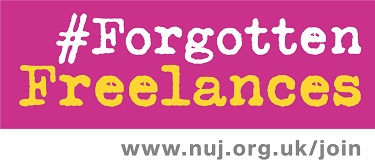#ForgottenFreelances: hardship schemes announced
The NUJ has called for greater financial assistance from governments and employers for freelances as the Scottish government launches a hardship fund.
The Scottish government has announced a £100m package of additional grant support for small and medium sized businesses (SMEs) and newly self-employed people.
Three separate funds will be administered by local authorities and Scotland's enterprise agencies and will begin to pay out grants in early May.
They include:
- a £34 million hardship fund for the newly self-employed;
- a £20 million fund for small and micro enterprises in the creative, tourism and hospitality sectors
- and £45 million for viable, but vulnerable SMEs crucial to the Scottish economy.
Applicants can access these funds and more via the FindBusinessSupport.gov.scot website.
Fiona Hyslop, Economy Secretary, said:
"I am particularly pleased that we will be able to help the newly self-employed who do not qualify for the UK's scheme and are facing financial hardship as a result of coronavirus (COVID-19).
John Toner, NUJ Scottish national organiser, said:
"When times are tough, freelances tend to have it tougher than most through the insecurity of their working relationships. We welcome all the support from governments, but I am particularly pleased that the Scottish Government has listened to trades unions and other bodies. The support for newly self-employed people is something that we have pushed for."
Pamela Morton, NUJ national freelance organiser said:
"We will continue to press the UK government for more support for the many individuals we know are falling through the gaps in the support schemes. Freelances and the self-employed are crucial to our industry and the economy and governments must support them in this crisis. I have seen reports that up to 2m individuals with self-employed income are not covered by the Self-Employment Income Support Scheme and that is unacceptable. The UK government must follow the lead of the Scottish and Welsh governments which recognised the gaps and found additional funding. Employers too must not hang out to dry the freelances they normally depend upon."

© red engine
The NUJ has written a letter to the UK Chancellor Rishi Sunak which sets out a whole raft of circumstances which have left members high and dry, without government assistance.
The union is in discussions with the Treasury and Department for Digital, Culture, Media and Sport looking at ways to support freelances not adequately covered by government schemes offering aid during the Covid-19 crisis.
The BBC has also set up a hardship fund with the purpose of providing some temporary support for its freelances experiencing financial hardship as a result of cancellation of work and loss of income due to the pandemic. Key features of the fund are:
- PAYE freelancers engaged by BBC Public Service can request a net payment of up to £1,000 for the months of April 2020 and May 2020.
- Gross paid sole trader freelancers eligible for the Self-Employment Income Support Scheme can request a one-off payment up to £1,000.
- It is a time limited fund and will be open until 31 May, 2020.
Paul Siegert, NUJ national broadcasting organiser, said:
"The BBC's fund to help PAYE freelances, is a welcome step in the right direction. BBC PAYE freelances – a vital part of its workforce – are unable to be furloughed. Up until now, they have had little or no support. This fund offers much-needed financial assistance.
"However, these are loans that will have to be repaid. As it stands, PAYE freelances are falling through the gaps of the various Covid-19 support schemes on offer. We are continuing to call on the UK government to address this problem and to offer them the same financial support as others."
The latest NUJ briefing on Covid-19 support schemes and benefit packages: Statutory Sick Pay, Coronavirus Job Retention Scheme, Employment and Support Allowance, Universal Credit and Self-employment Income Support Scheme, Coronavirus Business Interruption Loan Scheme, Scottish Self-Employed Hardship Fund, Welsh Economic Resilience Fund.
